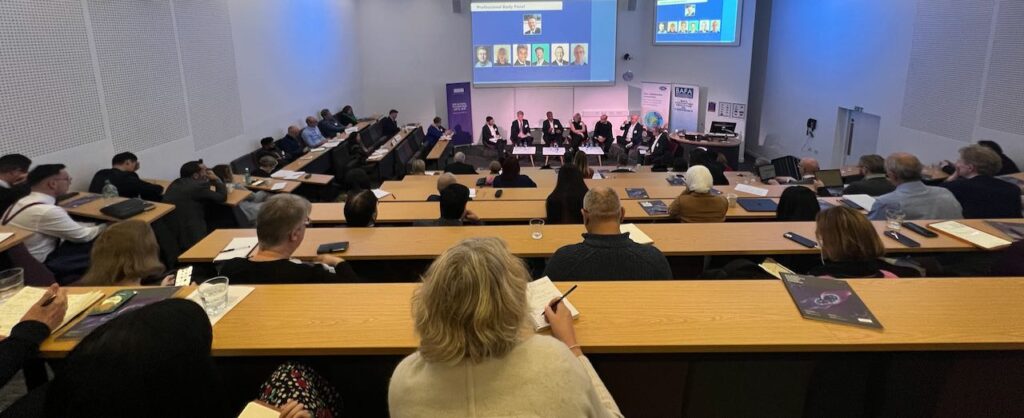Embedding sustainability in audit and accounting education
Posted by Toby York. Last updated: October 21, 2024
“Embedding Sustainability in Audit and Accounting Education – A forum for professional accountancy bodies, academics & training providers” was an event organised by the Financial Reporting Council (FRC) and the British Accounting and Finance Association (BAFA) at Alliance Manchester Business School on 1 November 2023.

Q: What’s the collective noun for a group of academics?
A: A complaint.
It’s an old gag that conforms to the trope but also holds an element of truth. Yesterday in Manchester, however, was different. There was a shift in the conversation that felt significant. Most of the academics were well-behaved, perhaps because the accounting regulator, professional bodies, training providers and the firms were there too. We were also reminded throughout the day that climate change poses a current existential threat to humanity. So, maybe (at last, some may say) there’s a realisation that sustainability accounting is important and urgently needs our collective attention.
Nicola Campbell, Head of Qualifications and Learning at the FRC highlighted this neatly. She asked delegates whether they had been affected by climate change and if they had changed their lifestyle in any way due to climate change. By my reckoning, over two-thirds of the room had. And these people are primarily from populations shielded from its worst and more immediate effects.
This article doesn’t cover even half of the content and is by no means an official report of the day. It’s just my five key takeaways. If I’ve missed something significant to you, please add a comment.
It’s daunting and complicated
Sustainability represents the biggest and most complex challenge facing humanity since mass industrialisation. It affects every aspect of society worldwide: the environment, politics, the economy, communities, jobs and lifestyles.
Accountants will not save the world single-handedly, but their “old ways” of thinking aren’t fit for purpose. We must expect radical changes to financial accounting, reporting and assurance sooner than you think. Greg Owens, Global Director of Assurance at BDO and a member of IFAC’s International Panel on Accountancy Education summed up the feeling among BDO staff, “They know it’s coming, and they’re scared.” This was endorsed by others in the room with a general sentiment that if you’re not scared, you haven’t been paying attention.
Takeaway #1 — pay attention.
Sustainability accounting is no longer an add-on. It’s mainstream.
Mark Babington, Executive Director of Regulatory Standards at the FRC, outlined some of the challenges we face. Specifically, society needs high-quality and trustworthy information to inform public policies and investment and lifestyle decisions. He acknowledged the achievements of various bodies in creating reporting frameworks but called for a broader approach to the challenge. He warned that available data sets are immature, the regulatory frameworks do not yet exist, our capacity to educate professionals is constrained, and the accounting education syllabus must adapt to attract and develop bright, questioning people.
Jan Bebbington, Director of Pentland Centre for Sustainability in Business at Lancaster University, agreed that accountants are crucial in shaping economic and organisational outcomes. She also provided some historical context, concluding that sustainable economic growth will not be possible using existing economic models, systems and incentives. We need to make radical changes, and part of that is bringing sustainability accounting into the mainstream.
Takeaway #2 — don’t ignore it.
Sustainability accounting is different, but accountants are well placed to do it.
Richard Barker, Board Member at the International Sustainability Standards Board (ISSB) outlined why accountants are well-placed to develop expertise in sustainability accounting. Much of what’s required is not new: narrative reporting, integrated reporting, and engaging with stakeholders. The same accounting and control systems used for financial reporting are necessary for sustainability reporting. This is all familiar territory.
He went on to outline some differences. Financial reporting is concerned mainly with performance from controlled activities, whereas sustainability is about the value chain outside of an entity’s control. Sustainability reporting is vague and still being created. We haven’t yet agreed on its scope, and the metrics vary considerably by sector. Norms still need to develop.
Become a member
We’re building a community for students and teachers to learn from each other. Currently, membership is free.
Join todayNick Rowbottom from the University of Birmingham provided an example using materiality. He explained that our traditional understanding of materiality is financial — what are the expected effects on cash flows and enterprise values? Sustainability accounting, however, is concerned with impact materiality — what are the expected social and environmental effects? And, of course, issues that are material from a social or environmental perspective might become material from a financial perspective. This gives rise to the concept of “dynamic materiality”.
Chris Humphrey, University of Manchester, said the efforts were “laudable, but an experiment. Standards are being set in the hope they will work, not in the knowledge that they’ll work. “It’s a risk to ask what investors want because they didn’t get into this business to save the planet.
Takeaway #3 — we’re not ready, but it’s coming anyway.
The future accountant may look very different to the current one
A recurring theme throughout the day was what the future accountant might look like. There was general agreement that it’s not about learning a new compliance framework but creating experts to add value to society. This was linked to the current perceived unattractiveness of the profession.
Jan Bebbington hoped the changes might diversify career aspirations beyond good salaries. Greg Owens is confident that aspiring accountants are engaged and on board. He said it was now common for interviewees to challenge BDO on its behaviours.
There are concerns about the scope and depth of the curriculum and an understanding that we can’t keep adding to it. Khalid Hamid, International Director at CIPFA, believes significant disruption is required with a better understanding of what “day one” knowledge looks like and how this might be developed with CPD.
Another challenge is the capacity of the existing body of accounting professionals to adapt to the new capabilities required.
Takeaway #4 — the accountant of the future might be [even] more interesting.
Start changing your education practice now
Jenni Rose, University of Manchester, called on accounting educators to address the issue now. She called on us to commit to one change in our current teaching practice, however small.
Various possibilities cropped up during the day. Greg Owens gave the example of taking a disclosure note from a sustainability report and asking students to “attack it”, or what academics might describe as “critically evaluate”. He stressed the importance of developing a sceptical mindset and to lean into the discomfort of developing “intellectual uncertainty”.
Shona Russell and Ian Thomson, representing the Centre for Social and Environmental Research (CSEAR), provided a similar example, requiring students to develop a disclosure note based on what they might expect a company to produce. After creating their version they compare it with the company’s disclosure note and evaluate.
Shona reported on a cross-institutional to develop a sustainability accounting platform for a green economy.
More elaborate was their example of using dramatised role-play with professional actors. This allowed students to experience what it means to be an accountant in an unwinding situation. In “Act One”, students negotiate the price of concrete for constructing an oil rig. They naturally focus on prices and contract terms. It’s only in “Act Two” that they learn the oil rig was Deepwater Horizon, which catastrophically exploded in 2010, killing eleven crew. Against that backdrop, they must explain their decisions in Act One.
Contact CSEAR for more information about these initiatives.
Takeaway #5 — do something!
Yes, embedding sustainability in audit and accounting education is a massive challenge. But remember, there are brilliant, generous and creative academics and professionals with the experience and resources to help you.
© AccountingCafe.org
Part of the Pedagogy series
Join the Accounting Cafe community





Thanks. Very useful summary.